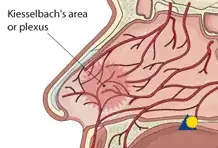I can't address how you can avoid your body temperature rising with certain foods like almonds or raisins, as I'm unfamiliar with that issue. Soups can be eaten cold or at room temperature, and you can lower your body temperature slightly with iced drinks, quick sponge baths, etc.
But controlling the most frequent causes of nosebleeds might help you reduce their occurrance.
The vast majority of bloody noses in healthy individuals (by that, I mean people without specific diseases of the blood or mucous membranes, etc.) arise from one specific area in the nose (on either side):

In the mucosa of the nasal septum (the cartilagenous structure separating the nose into two sides), there is an area where several arteries "meet", giving it an exceptionally rich vascular supply, called Kiesselbach's plexus. It is on the anterior surface, and exposed to dry air and trauma (even such as might be sustained by a bad cold). People often get nosebleeds from nasal mucosal irritation due to upper respiratory infections. Bleeding typically occurs when the mucosa erodes for any reason, and the capillaries and venules (and sometimes arterioles) become exposed and subsequently break. The result is the familiar bloody dripping of a nosebleed.
The most common treatment is direct pressure (squeezing the sides of the nose together) for 5-10 minutes. This works because putting direct pressure on any bleed stops the blood flow long enough for a clot to form and the arteriole to close down. If needed, more aggressive control can be achieved by a professional.
Besides the immediate treatment of bloody noses, anything that helps with the integrity of the nasal mucosa is going to help reduce nosebleeds. One can
- run a humidifier in dry weather
- avoid irritating by touching the nose or blowing nose too often
- apply a very light layer of petrolatum or Bacitracin ointment to the inside of the nose covering Kiesselbach's plexus at night so the nose-breathing doesn't dry out your nose
- use nasal saline spray to moisten and soothe the nasal membranes (don't rub the tip of the spray bottle against the nasal membranes, though)
*more serious or recurrent bleeding needs medical attention to rule out other conditions that are associated with frequent nose bleeds.
Edited to reflect additional information.
Epistaxis
